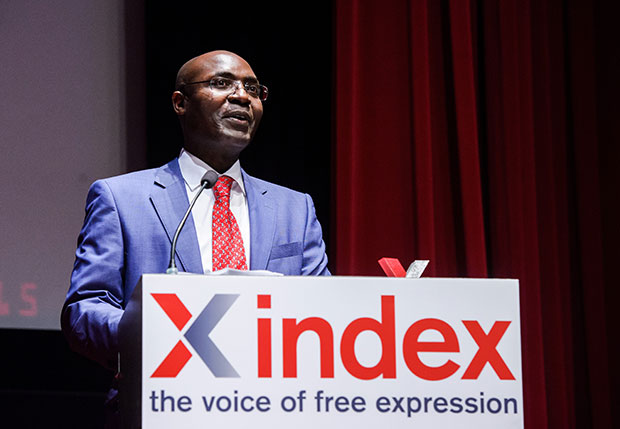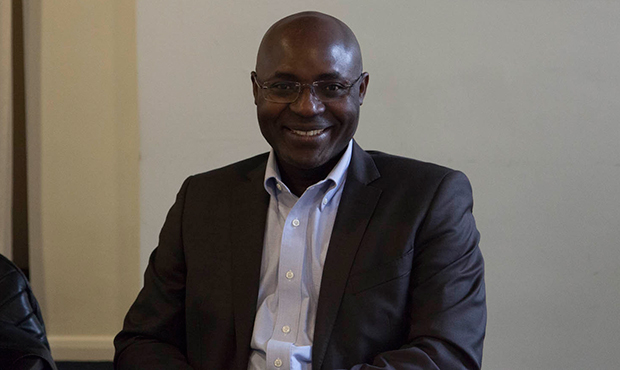Index relies entirely on the support of donors and readers to do its work.
Help us keep amplifying censored voices today.

Journalist and human rights activist Rafael Marques de Morais (Photo: Alex Brenner for Index on Censorship)
International signatories from the worlds of technology, journalism, publishing, theatre, film and business, including jewellers Tiffany & Co, called on Angolan president José Eduardo dos Santos on Tuesday to drop the prosecution of award-winning investigative journalist Rafael Marques de Morais.
Marques was last week given a six-month suspended sentence following a trial in which he faced criminal defamation charges over his 2011 book on blood diamonds, which was published for the first time in English on Tuesday.
“Rafael’s trial was a sham. He was told charges would be dropped, only for him to be hit with new charges out of the blue, and he was not allowed to present his evidence or call witnesses,” said Jodie Ginsberg, CEO of freedom of expression group Index on Censorship, which organised the letter.
“Rafael is a courageous journalist, working with little support to expose corruption in Angola. This absurd trial and verdict is meant to stop him from speaking out. We want to make sure that does not happen.”
Marques was awarded an Index on Censorship Freedom of Expression award in March for his work. Signatories to the letter include jewellers Tiffany & Co.; tech entrepreneurs Martha Lane Fox, one of the judges of the awards, and Wikipedia founder Jimmy Wales; authors Philip Pullman, Neil Gaiman and Elif Shafak; actors Janet Suzman, Juliet Stevenson, and Simon Callow; playwrights Howard Brenton and Timberlake Wertenbaker; as well as Steve McQueen, director of Oscar-winning film 12 Years a Slave. Other signatories included journalists Sir Harold Evans and Christina Lamb; and artists and writers with direct experience of censorship, such as Syrian political cartoonist Ali Ferzat and Azerbaijani journalist Idrak Abbasov.
The letter will be delivered by Index on Censorship to the Embassy of Angola in London on Tuesday, June 2.
For more information, contact David Heinemann on 0207 260 2664 or email [email protected].
The letter
We, the undersigned, call on Angolan President José Eduardo dos Santos to drop the prosecution of journalist Rafael Marques de Morais.
Marques’ vital investigations into human rights abuses should not be impeded by the threat of jail, which is set to loom over him for two years under the court’s terms.
His conviction and six-month suspended sentence are a clear violation of the rights to free expression, to a free press and to a fair trial.
Marques’ reporting is fundamental not only to Angola, but to the world at large.
We call on you to ensure standards of international law are applied during the appeal process.
Yours faithfully,
Ali Ferzat, cartoonist
Angela Quintal, editor, Mail & Guardian, South Africa
Dame Ann Leslie, journalist
Anthony Barling, lawyer
Art Kaufman, World Movement for Democracy
Bob Fu, founder and president, ChinaAid
Brilliant Earth Jewellery
Carl Gershman, president, National Endowment for Democracy
Chantal Uwimana, Transparency International
Chie Murakami, director general, Diamonds for Peace, Japan
Christopher Hird, film producer
Christophe Deloire, secretary-general, Reporters Without Borders
Christina Lamb OBE, journalist
David Aaronovitch, columnist
David Harewood MBE, actor
David McCune, publisher
David Schlesinger, founder, Tripod Advisors
Dreda Say Mitchell, author
Edward Fitzgerald CBE QC, lawyer
Elaine Potter, journalist
Elif Shafak, author
Geoffrey Hosking OBE, historian
Grigory Pasko, journalist
Sir Harold Evans, journalist
Howard Brenton, playwright
Idrak Abbasov, journalist
Janet Suzman, actor and director
Jesper Højberg, executive director, International Media Support
Jeffrey Smith, Robert F Kennedy Centre for Justice & Human Rights
Jimmy Wales, founder, Wikipedia
Jodie Ginsberg, chief executive, Index on Censorship
John Witherow, editor, The Times, UK
Juliet Stevenson, actor
Kamila Shamsie, author
Kostas Vaxevanis, journalist
Lara Pawson, author of In the Name of the People: Angola’s Forgotten Massacre
Larry Kilman, secretary-general, World Association of Newspapers and News Publishers
Leber Jeweler Inc
Lee Hirsch, film director
Lindsey Hilsum, journalist
Louise Redvers, journalist
Mariane Pearl, journalist
Mark Stephens CBE, senior member, Howard Kennedy LLP
Martha Lane Fox CBE, House of Lords
Mary Lawlor, executive director, Front Line Defenders
Maya Wolfe-Robinson, journalist
Matthew d’Ancona, journalist
Matthew Parris, journalist
Mohamed Al-Dharadji, film director
Neil Gaiman, author
Paul Webster, film producer
Peter Oborne, journalist
Peter Kellner, president, YouGov
Peter Pomerantsev, author
Peter Tatchell, director, Peter Tatchell Foundation
Philip Pullman, author
Rahim Haciyev, editor, Azadliq, Azerbaijan
Richard Sambrook, director, Centre for Journalism, Cardiff University
Ronald Deibert, academic
Robert McCrum, writer and editor
Sanar Yurdatapan, Initiative for Freedom of Expression, Turkey
Shubhranshu Choudhary, journalist
Simon Callow CBE, actor
Steve McQueen CBE, film director
Sue Woodford-Hollick OBE, businesswoman
Sue Valentine, Committee to Protect Journalists Africa Programme
Suzanne Nossel, executive director, PEN American Centre
Stephen Hull, editor-in-chief, Huffington Post UK
Thomas Hughes, executive director, Article 19
Tiffany & Co.
Timberlake Wertenbaker, playwright
Turi Munthe, founder, Demotix
Yoav Shamir, filmmaker
Ziyad Marar, publisher

Journalist and human rights activist Rafael Marques de Morais (Photo: Sean Gallagher/Index on Censorship)
Angolan investigative journalist and Index on Censorship award-winner Rafael Marques de Morais was handed down a six-month suspended sentence in Luanda on Thursday 28 May 2015, less than a week after celebrating an apparent dismissal of all charges.
Last Thursday, it had been widely understood that the case against him – in which he was accused of defaming several generals in a 2011 book about human-rights violations in the diamond industry – had been dropped. All parties appeared to have reached an agreement, whereby Marques would not republish his book but could continue his work.
However, the public prosecutor said on Monday 25 May 2015 that Marques’ statement was an admission of guilt and called for him to receive a suspended sentence.
Speaking to Index ahead of the sentencing, Marques said: “The public prosecutor put words in my mouth. He said that I had apologised, and had admitted to have written falsehoods.”
Marques’ witnesses, including a mother of a victim who was hacked to death in the Lundas mining region, were never given the chance to speak in court, after the case was “dismissed” in a move that Marques now believes was “a trick”.
Marques has been convicted for malicious prosecution, not defamation. The malicious prosecution charges (saying that he intentionally submitted false evidence) were added – in another unexpected move – on his first day in court in March.
The six-month suspended sentence has a term of two years, during which if he engages in any behaviour the state deems as criminal, the sentence will be implemented. Marques will be launching an appeal.
Over 50 signatories – including Index on Censorship, Amnesty International, Human Rights Watch and other international NGOs – have written a letter to Angolan President José Eduardo Dos Santos, demanding urgent action on Marques’ case and calling for Angola’s criminal defamation laws to be abolished.
In March, just days before the trial started, Marques attended Index on Censorship’s Freedom of Expression Awards in London, where he received the journalism award for his courageous and vital investigations. In a speech, he said: “I am proud and honoured to stand up against such a mighty power to enable many of the victims to speak out through my reports, which I have been producing for the past 10 years.”
Index on Censorship’s CEO Jodie Ginsberg said: “We are appalled to hear that Rafael has been sentenced after an absurd process. This is a clear violation of rights to free expression, to a free press and to a fair trial. We are extremely concerned not only about Rafael, whose work is so incredibly important, but also that cases like this are being used to deter others from speaking out. We feel a suspended sentence over two years will curb his ongoing work, which has recently included highlighting Angola’s press restrictions and reporting on a massacre of members of a sect by police forces.”
This article was posted on 28 May 2015 at indexoncensorship.org

Journalist and human rights activist Rafael Marques de Morais (Photo: Alex Brenner for Index on Censorship)
The trial of Index award winning investigative journalist Rafael Marques de Morais ended 21 May 2015 after the charges were dropped.
“Great news indeed,” Marques de Morais told Index.
“In light of a number of free speech concerns in the region, it’s vital that the charges against Rafael Marques de Morais have been dropped. Rafael’s crucial investigations into human rights abuses in Angola should not be impeded,” said Index on Censorship CEO Jodie Ginsberg.
Marques de Morais was being sued for libel by a group of generals in connection to his work exposing corruption and serious human rights violations connected to the diamond trade in his native Angola.
The case was directly linked to Marques de Morais’ 2011 book Blood Diamonds: Torture and Corruption in Angola. In it, he recounted 500 cases of torture and 100 murders of villagers living near diamond mines, carried out by private security companies and military officials. He filed charges of crimes against humanity against seven generals, holding them morally responsible for atrocities committed. After his case was dropped by the prosecution, the generals retaliated with a series of libel lawsuits in Angola and Portugal.
Marques de Morais originally faced nine charges of defamation, but on his first court appearance on 23 March was handed down an additional 15 charges. The proceedings were marked by heavy police presence, and five people were arrested. The trial opened just days after he was named joint winner of the 2015 Index Award for journalism.
The parties had been negotiating to try and find some “common ground”, Marques de Morais told Index in late April, but the talks broke down. His case was postponed to 14 May while the talks were ongoing.
The resumption of the trial came amid allegations of a massacre of members of a religious sect that Marques de Morais reported on for The Guardian. MakaAngola, Marques de Morais’ investigative journalism site, was knocked offline for a short period after The Guardian article.
This article was posted on 21 May 2015 at indexoncensorship.org

Journalist and human rights activist Rafael Marques de Morais (Photo: Alex Brenner for Index on Censorship)
The trial of Index award winning investigative journalist Rafael Marques de Morais is set to resume today. Marques de Morais is being sued for libel by a group of generals in connection to his work exposing corruption and serious human rights violations connected to the diamond trade in his native Angola.
The case is directly linked to Marques de Morais’ 2011 book Blood Diamonds: Torture and Corruption in Angola. In it, he recounted 500 cases of torture and 100 murders of villagers living near diamond mines, carried out by private security companies and military officials. He filed charges of crimes against humanity against seven generals, holding them morally responsible for atrocities committed. After his case was dropped by the prosecutions, the generals retaliated with a series of libel lawsuits in Angola and Portugal.
“Rafael’s crucial investigations into human rights abuses in Angola should not be impeded. Index calls on the court and the government to dismiss all charges against him,” said Index on Censorship CEO Jodie Ginsberg.
Marques de Morais originally faced nine charges of defamation, but on his first court appearance on 23 March was handed down an additional 15 charges. The proceedings were marked by heavy police presence, and five people were arrested. This came just days after he was named joint winner of the 2015 Index Award for journalism.
The parties had been negotiating to try and find some “common ground”, Marques de Morais told Index in late April, but the talks broke down. His case was postponed to 14 May while the talks were ongoing.
The resumption of the trial comes amid allegations of a massacre of members of a religious sect that Marques de Morais reported on for The Guardian.
This article was posted on 14 May 2015 at indexoncensorship.org